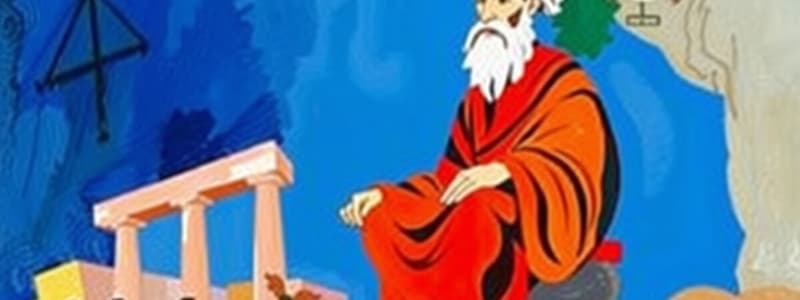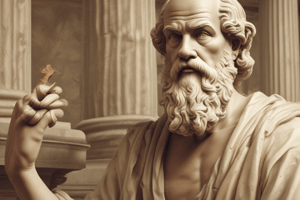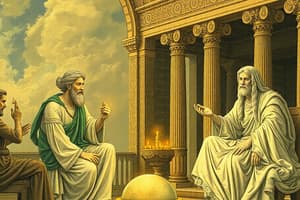Podcast
Questions and Answers
How did Socrates view his own wisdom compared to that of his disciples?
How did Socrates view his own wisdom compared to that of his disciples?
Which of the following best describes the temperament Socrates demonstrated in his dealings with others?
Which of the following best describes the temperament Socrates demonstrated in his dealings with others?
Who primarily recorded Socrates’ views for posterity?
Who primarily recorded Socrates’ views for posterity?
What did the Sophists believe regarding truth and knowledge?
What did the Sophists believe regarding truth and knowledge?
Signup and view all the answers
What was a primary aim of the Sophists in their teachings?
What was a primary aim of the Sophists in their teachings?
Signup and view all the answers
How did Protagoras describe the nature of existence and opinion?
How did Protagoras describe the nature of existence and opinion?
Signup and view all the answers
What was one of the primary accusations against Socrates during his trial?
What was one of the primary accusations against Socrates during his trial?
Signup and view all the answers
Who was one of Socrates' main accusers?
Who was one of Socrates' main accusers?
Signup and view all the answers
Which aspect of Socrates' character did he prioritize over avoiding condemnation?
Which aspect of Socrates' character did he prioritize over avoiding condemnation?
Signup and view all the answers
What was Socrates' final thought regarding his debt to Asclepius?
What was Socrates' final thought regarding his debt to Asclepius?
Signup and view all the answers
How did Socrates react to the presence of death, according to the context provided?
How did Socrates react to the presence of death, according to the context provided?
Signup and view all the answers
What did Socrates argue was necessary for a fulfilling human existence?
What did Socrates argue was necessary for a fulfilling human existence?
Signup and view all the answers
What metaphor did Socrates use to describe his role in the city of Athens?
What metaphor did Socrates use to describe his role in the city of Athens?
Signup and view all the answers
What did Socrates believe was essential for human fulfillment?
What did Socrates believe was essential for human fulfillment?
Signup and view all the answers
What characterizes Socratic dialogue, according to the reading?
What characterizes Socratic dialogue, according to the reading?
Signup and view all the answers
Study Notes
Socrates' Life and Context
- Lived in Athens during a period characterized by wealth, peace, and cultural flourishing (454 BCE to 430 BCE).
- Engaged in public discussions about politics, beauty, piety, and ethics, drawing the interest of those known as philosophers.
- Socrates did not write down his thoughts; his ideas are primarily known through Plato's dialogues, plays of Aristophanes, and writings of Xenophon.
Socrates' Background and Education
- Born to Sophronicus (a sculptor) and Phaenarete (a midwife); his education included gymnastics, grammar, music, and arts.
- Initially aspired to follow in his father’s footsteps as a sculptor, later relating his philosophical method to sculpture and midwifery.
Philosophical Methodology
- Compared the sculptor's work of revealing a statue within stone to uncovering innate wisdom in his students through questioning.
- Used metaphors of midwifery to explain his role in assisting others to explore their thoughts and beliefs.
Personal Attributes and Lifestyle
- Known for his eccentricity, poverty, and indifference to discomfort; lived a simple, frugal life.
- Served as a soldier in multiple campaigns, earning civic recognition for bravery, particularly for rescuing his students Alcibiades and Xenophon in battle.
Political Engagement
- Became a member and later president of the council of Five Hundred in Athens, where he upheld justice against public pressure.
- Stood firm against wrongful condemnation, illustrating a commitment to moral principles and justice.
Opposition to Sophistry
- Opposed the Sophists, seeking to educate citizens towards a better philosophy through public engagement.
- Engaged individuals across social strata in conversations about ethics, morality, societal roles, and duties.
Influence and Legacy
- Notable disciples included Alcibiades, Crito, Xenophon, and Plato, emphasizing his impact on subsequent philosophical thought.
- Instruction focused on various subjects including ethics and logic, delivered through dialogue rather than formal lectures, known as the Socratic method.
Socratic Method
- Emphasized critical thinking through a question-and-answer format, fostering independent thought and personal discovery among students.
- Successfully engaged students’ minds, emphasizing the importance of enlightenment and self-improvement in his teachings.
Character and Philosophy
- Demonstrated a calm demeanor and cheerful disposition even amid challenges; maintained a strong philosophical outlook throughout life.
- Believed in the innate capacity for wisdom in every individual, with a mission to help them realize their potential through reasoned dialogue.
Conclusion
- Socrates profoundly influenced Western philosophy, with his techniques and ideas forming the foundation for many philosophical discussions that followed, shaping education and thought for centuries to come.
Sophists and Their Philosophy
- Sophists emerged in Socrates' time, distinguishing themselves as educators rather than traditional philosophers.
- They emphasized rhetoric and debate, teaching techniques for persuasion rather than seeking objective truths.
- No unified philosophical doctrine linked sophists; education was more about personal opinion than universal truths.
- Key topics in their curriculum included language, semantics, grammar, social sciences, mathematics, and history.
- Prominent sophists included Protagoras, Gorgias, Hippias, Prodicus, and Thrasymachus.
Historical Context
- The fifth century BCE was a golden age for Greece, particularly during "The Age of Pericles."
- Pericles (495-429 BCE) promoted arts, culture, and democracy, fostering an environment for diverse thought.
- With newfound democratic freedoms, a skeptical view of truth emerged, suggesting personal perceptions could define reality.
Epistemic and Moral Relativism
- Sophists were epistemic relativists, rejecting the notion of an objective truth.
- They argued people's beliefs are subjective; what is true for one may not be true for another.
- This view blurred the lines between knowledge, belief, opinion, truth, and reality.
Impact on Philosophy and Politics
- Sophists contributed to the collapse of traditional philosophies and political systems, fostering individualism in thought.
- Rhetorical techniques, like 'commonplaces,' facilitated persuasive speech in political and public arenas, regardless of truth.
- A shift occurred where the goal of philosophy became personal success over searching for universal truths.
Protagoras' Influence
- Protagoras was a key figure among sophists, known for being the first to teach for payment and adopting the title 'Sophist.'
- His famous principle, "Man is the measure of all things," underscored his view that individual perception shapes truth.
- Protagoras influenced Athenian politics; he assisted in drafting laws for new colonies and gained prominence through his teachings.
Socrates' Response
- Socrates emerged as a counter to sophistic thought, advocating for a pursuit of objective truth and moral integrity.
- The sophists' focus on persuasion and subjective truths prompted Socrates' challenge to their teachings.
Engaging Conversations Through Questions
- Selecting a broad topic such as Life, Beauty, or God encourages diverse viewpoints.
- The goal is to foster discussion rather than provide personal opinions or answers.
- Questions should be open-ended to facilitate deeper exploration of the chosen topic.
Techniques for Engagement
- Encourage friends to define their terms to clarify their perspectives.
- Use follow-up questions to stimulate further discussion and avoid dominating the conversation.
- Maintain a curious mindset, prioritizing inquiry over conclusions.
Observing Reactions
- Monitor emotional responses during the dialogue:
- Frustration may arise from differing viewpoints or the inability to reach conclusions.
- Enjoyment could result from a stimulating exchange of ideas.
- A feeling of being listened to can strengthen interpersonal connections.
Relationship Dynamics
- Sharing thoughts in a question-driven format may foster closeness among friends.
- Exploring individual beliefs can lead to greater understanding and empathy within the group.
Socrates' Trial Overview
- In 399 BC, Socrates faced trial in Athens for corrupting youth and impiety against traditional gods.
- The trial is one of history's most notable legal battles, showcasing philosophical and political tensions.
Accusations Against Socrates
- Accuser Melitus claimed Socrates denied the state's gods and introduced new deities.
- The charges included influencing young Athenians towards dangerous ideas.
- Melitus, a lesser-known tragedy writer, coordinated with influential enemies Anytus and Lycon to bring forth the accusations.
Socrates' Age and Reputation
- At seventy, Socrates was already an esteemed figure, though increasingly viewed as a threat by some citizens.
- The Athenian populace's perception shifted following ridicule in works by comedic playwright Aristophanes, leading to diminished respect for Socrates.
Groups Opposing Socrates
- The opposition consisted mainly of two factions:
- Citizens who admired his intellect but feared his ideas could destabilize traditional beliefs.
- Superstitious individuals feeling threatened by his philosophy, often harboring envy towards his wisdom.
Defense and Philosophy
- Socrates refused to flee or utilize elaborate defenses, preferring to uphold his principles.
- He asserted that true wisdom lies in recognizing one's own ignorance and challenged those claiming wisdom.
The Role of Oracle of Delphi
- Socrates related an experience where a friend queried the Delphi oracle, which declared him the wisest man.
- This struck Socrates as paradoxical since he did not perceive himself as wise, driving him to inquire into the wisdom of others, which ultimately led to enmity.
Key Themes from Socrates' Defense
- Socrates emphasized that true wisdom is recognizing one’s ignorance.
- He claimed that many considered wise were actually misguided, igniting hostility toward him.
- His lifelong quest for truth and virtue over personal gain positioned him as both a philosopher and a social critic.
Plea for Sentencing
- Post-verdict, Socrates demonstrated a lack of regret, acknowledging expected condemnation.
- He proposed a fitting reward for his lifelong service to others: maintenance in the Prytaneum, denoting public appreciation and support.
Final Reflections on Death
- Socrates contemplated the nature of death, proposing it as either a peaceful state of unconsciousness or a transition to a more enlightened realm.
- He concluded that no harm befalls a good person, highlighting a belief in divine justice.
Legacy
- Socrates' trial underscored the tension between individual thought and state authority, influencing future philosophical and ethical discourses.
- His commitment to his principles, even in facing death, set a precedent for later thinkers and established a critical aspect of Western philosophy.
Socrates' Death
- Socrates chose death over exile, facing a sentence of hemlock poisoning from the Athenians.
- His final moments are documented in Plato's dialogue, "Phaedo."
- Crito, Socrates' friend, facilitated the proceedings by calling for the jailer to bring the poison.
The Poisoning Process
- Socrates calmly asked the jailer how to proceed with drinking the poison.
- He expressed a desire to make a libation to the gods before drinking, underscoring his piety and philosophical nature.
- He drank the poison cheerfully, which led to a wave of sorrow among his friends present.
Friends' Reactions
- The act of drinking triggered emotional reactions from Socrates' friends, with Crito and Apollodorus unable to contain their tears.
- Socrates encouraged composure, emphasizing the importance of dying in peace.
Physiological Changes
- As the poison took effect, Socrates walked about until he could no longer stand, at which point he lay down as instructed.
- He experienced numbness starting from his legs, progressing upward, with the jailer monitoring his physical state.
Final Moments and Legacy
- Socrates delivered his last words, requesting that Crito pay a debt he owed to Asclepius, a god of healing.
- He passed away shortly after, with Crito closing his eyes and mouth, marking the end of his life and philosophical journey.
Perspectives on Death
- Socrates exemplified a lack of fear toward death, reflecting philosophical beliefs of the time.
- His calm demeanor and rational approach to mortality are key points for understanding ancient views on death and the afterlife.
Socrates' Final Words and Legacy
- Socrates' last words on owing a debt to Asclepius were likely ironic, contrasting healing with charges of impiety.
- His death may symbolize liberation from the "disease" of life, aligning with his philosophical views on existence.
- Unlike earlier philosophers, Socrates emphasized the human condition and society, making philosophy a communal and engaging pursuit.
- His approach blended humor and seriousness, focusing on self-questioning, discovery, and knowledge as pathways to fulfillment.
- Socrates chose death over renouncing his philosophical teachings, showcasing his dedication to these principles.
Three Principles of Socratic Philosophy
-
Unexamined Life:
- Socrates stated that "the unexamined life is not worth living" during his trial, urging citizens to pursue deeper self-awareness.
- He shifted the focus from public accusations to urging Athenians to reflect on their inner lives.
- Socratic dialogues provide a model for clarity of thought, recognizing inconsistencies, and dialectical engagement, fostering closer proximity to truth.
- Understanding one's inner motivations is crucial; without self-awareness, pursuits like wealth or family can be misguided or harmful.
- Examined life serves as an anchor, prompting individuals to reassess values and priorities for genuine fulfillment.
-
Caring for the Soul:
- Socrates emphasized the paramount importance of tending to one's soul above material concerns like wealth and reputation.
- He critiqued the Athenian focus on externals and argued that true virtue arises from nurturing the inner self.
- He viewed himself as a "gadfly" to awaken the complacent Athenian public towards moral and civic duty.
- Socrates believed that a city can be "soul-sick," and enhancing collective virtue is essential for a flourishing democracy.
-
Injury and Virtue:
- Socrates argued that no external harm could affect a virtuous individual, rejecting the notion that punishment could injure a man of virtue.
- He maintained that wrongful acts against him would not diminish his virtue, instead harming the perpetrators, like Meletus and Anytus.
- External injuries (body, reputation, possessions) cannot touch an individual devoted to the care of the soul, which remains strong against adversity.
- True harm stems from self-imposed unethical behavior, emphasizing that the greatest detriment is failing to nurture one's inner life.
Studying That Suits You
Use AI to generate personalized quizzes and flashcards to suit your learning preferences.
Description
Explore the rich intellectual environment of Athens during Socrates' lifetime. This quiz delves into the political, artistic, and philosophical discussions that defined this era of creativity and leisure before the Peloponnesian War. Test your knowledge of classical thought and Athenian society!




